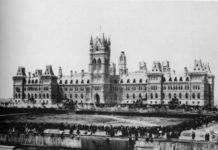The history of any country, county, or community is full of little incidents and facts that are often overlooked in telling their stories. Little things that may not deserve mention in more general works may have a fascination of their own. Indeed, sometimes those apparently trivial events had a much greater impact on the people of the time than we can now imagine. Here’s a few of them.
When the Province of Upper Canada was established in 1791, the governing authorities wished to see the emergence of a minor aristocracy, large land owners who would rise to positions of leadership in the community. At the time, this necessarily meant Protestant men. Even more, it meant Anglican men (and it was all men). During that same period in the history of Ontario, the position of the Anglican Church was to be as close to a State Church as possible, as having government run by Catholics was illegal, and Methodists and Presbyterians (other than Scottish Presbyterians) were looked on as fanatical and tending to hold democratic, that is, mob rule, principles.
So it was that the laws passed in the first Assemblies in Upper Canada recognised only those marriages presided over by an Anglican priest as having legal validity. An exception was made for those couples who lived in a district that had fewer than five Anglian clergymen in residence. In their case, a civil marriage was permitted. Marriages solemnised by any other type of minister, pastor, or whatever, were simply not legal. It was to be some years, even decades, before other Christian denominations were recognised in law as having the legal right to perform marriages.
————————
A wonderful sight could be seen in the 1880’s, as Mike Driscoll and Owen McGovern from Oxford Mills walked their 150 geese and turkeys from Kemptville to Prescott and on to the ferry to Ogdensburg. The men and birds would walk the length of the plank road that ran between the two towns, past the toll booth where the road crossed the railway tracks outside Kemptville. When the birds got tired walking, they would be taken up on to a cart to rest. Then some tar, gravel and sand would be applied to their feet – shoeing the geese – so they could walk the road again.
At night, the turkeys would roost on fences, the geese would settle by the side of the road until morning. Then the men would call the birds together and off they’d go again. It took four days for the trip from Kemptville to Ogdensburg, via Prescott. What a sight that must have been: two men and 150 geese and turkeys, making their way along the plank road and across the Saint Lawrence to the markets in Boston and New York.
————————
In 1905, the blacksmiths of this region formed an alliance to push through an increase in what they charged for their work. Knowing that there would be opposition to the raising of rates, the twelve men (and they were all men) signed a letter in which they agreed to “pledge our word and honor as men to abide by the above mentioned prices and rules”. Clearly, this was a matter of some importance, and the letter they signed was written to assure anyone who would try and break their alliance by influencing one of their number to maintain the lower prices for service.
The twelve blacksmiths represented the communities of Oxford Mills (J. Kingston and Robert Lindsay), Burritt’s Rapids (D. B. Davis and W. H. Derrick), Merrickville (Charles Edwards and J. F. Hicks), Andrewsville (W. J. Quinn), and Kemptville (James Tobin, T. M. Griffin, George Taylor, William Spotswood, and Zachariah Beach).
The terms they used may seem rather extravagant to us today. In reject- ing the idea that one of them would buckle under pressure from customers, they declared:
“Apparently their object is to see if some one of the twelve is not weak minded enough to betray the cause, degrade his word and honor and become a Judas”.
Standing strongly against any suggestion of dishonourable dealings, the twelve blacksmiths insisted that their price for shoeing a horse would rise, from 10¢ cents to 15¢, while the cost of new shoes would go up from 25¢ to 30¢. On such small things blacksmith’s honour and integrity depends.








